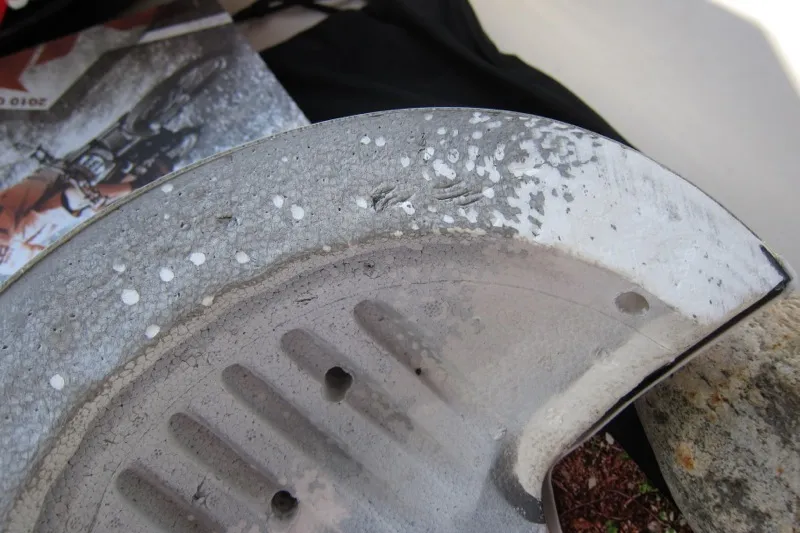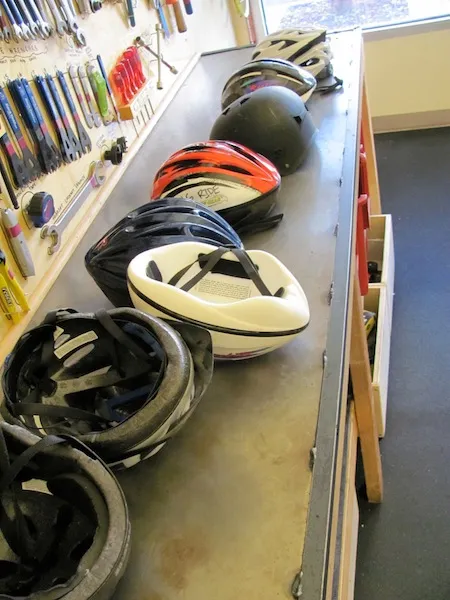Bicycle helmets are designed to protect a cyclist’s head from a crash, but after a major spill a helmet needs to be replaced. From here the used helmet is bound for a landfill, and because most bicycle helmets are made of EPS, a form of polystyrene, it won’t biodegrade for hundreds of years. But what if you could recycle the helmet or even use it for fuel? That’s the answer one Portland, OR cyclist is looking for.
Self-described “energy and efficiency expert,” Jason Jepsen believes helmets could be more efficiently recycled, and possibly even used as a form of fuel.
Jepsen, who has met with other recycling experts including Specialized’s full-time sustainability strategist, Bryant Bainbridge, says much of the problem isn’t just the EPS, but rather the fact that helmets are made of numerous materials, most of which can’t be recycled together. “To recycle a helmet is a pretty labor intensive venture,” Jepsen told BikeRadar. “Helmets need to be collected at local bicycle shops, and then brought to a central location. From there it becomes manually intensive.”
To accommodate recyclers, Jepsen says that each helmet has to be manually disassembled, where the EPS is separated from the other materials, including the polycarbonate shells and straps. The hardest helmets to recycle are actually the highest end models that have in-molded materials that help strengthen and lighten the EPS. Anything that can’t be separated goes straight to the landfill.

In-molding makes it near impossible to separate helmet materials, which must be achieved to recycle it
“It is about segregating the materials,” says Jepsen, explaining that this is the key requirement for those materials to move on to the next stage.
While many materials today are recycled, and good money paid to those doing the collecting, this isn’t the case with EPS or the other components of bicycle helmets. In fact, Jepsen says collectors will take EPS, but it has to be totally clean, and no one is paying for the material at this point.

Older single material, and less advanced helmets are said to be the easiest to recycle
One company that takes EPS is Free Geek in Portland, which has the mission to reuse, refurbish and recycle a variety of materials. But even with recyclers willing to take the material, Jepsen says the issue holding back a large scale recycling effort is how the helmets are made. “I’ve reversed engineered the helmets,” says Jepsen, who also considered whether alternative — more easily recycled — materials can be used. “I’ve looked cork and leather or cork, but it just doesn’t compare. The truth is that the injection molding is very efficient in terms of energy used and there is actually very little waste.”
As a result the best solution still points to recycling, but issues remain. Once broken down the EPS can become a “sub-desirable foam product” and then shipped to China, where it can be reused in materials such as engineered lumber or other composite construction products. This, of course, uses large amounts of energy to reduce and ship the materials.
The other option that Jepsen is exploring is to turn the EPS into a fuel product. “I’m exploring the option of possibly grinding the whole helmet so that can be used by companies such as Agilyx in the process of making sweet crude [which can then be] turned into diesel fuel,” said Jepsen.
Agilyx is just one of several companies exploring methods of turning waste plastics to crude oil through a technique called pyrolysis, which involves the thermochemical decomposition of organic material at elevated temperatures without oxygen. But Jepsen notes that this system does have its detractors. “There are complaints that it still puts pollutants in the air,” says Jepsen, “but that’s still a lot better than putting into the water or sending the EPS on the slow boat to China.”
